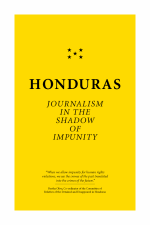Secondary menu
Honduras: Journalism in the Shadow of Impunity
 Partner Organization: PEN Canada, PEN International
Partner Organization: PEN Canada, PEN International
Student Author: Kaitlin Owens
Student Researchers: Bhuvana Sankaranarayanan, Liani Caban
The IHRP and PEN partnered to research and draft an advocacy report that analyzes impunity for violence against journalists as a major challenge to freedom of expression in Honduras. The report followed up on the IHRP-PEN’s very successful report on Mexico, Corruption, Impunity, Silence: The War on Mexico’s Journalists (2010).
Honduras: Journalism in the Shadow of Impunity, a joint publication with PEN International, PEN Canada and the IHRP documents the rise in violence against journalists following the coup d'etat that ousted President Jose Manuel Zelaya in June 2009, and the failure of both state and international mechanisms to investigate and punish those responsible. Since June 2009 at least 32 Honduran journalists have been killed and many more continue to work in a climate of fear and self-censorship. Download a copy of the report in English or Spanish.
The report was authored by Kaitlin Owens (JD '15), who was a Summer Fellow with the IHRP this past summer and part of a team conducting research in Honduras. Increasing levels of violence and widespread impunity has made Honduras one of the most dangerous countries in the world. While transnational drug cartels are, in part, responsible for the rising homicide rate, much of the current crisis of violence is produced by state authorities, according to the new report.
Corruption within the police force is alarmingly high, simultaneously undermining trust among state agencies, damaging public confidence in key institutions and ultimately hampering the institutional capacity of the justice system. There are too many agencies that notionally address the problem of violence and impunity, resulting in a situation where no one is accountable for ensuring justice for victims and their families.
The current climate of pervasive impunity in Honduras is the result of failures in accountability for serious human rights abuses spanning decades. Thus, the recent wave of murderous violence against journalists has been met with a familiar mixture of inadequate resources, bureaucratic ineptitude, blame-shifting and denial. Journalists' murders are rarely adequately investigated or solved: of the 38 journalists murdered since 2003, only two convictions have been obtained.
PEN International, PEN Canada and the IHRP are together calling on the Honduran government to fully investigate all cases of murdered journalists; and to empower existing state institutions and mechanisms and establish new ones where needed, to ensure that all members of the media are afforded the full protection of the law. The report also makes a series of recommendations to the Honduran media and the international community for the protection of journalists in the country, including a call for donor states such as the UK and Canada to work with Honduras on these issues. Canada, having signed a free-trade agreement with Honduras in November 2013, has important economic ties in the country, and may have particular influence.
In March 2014, the IHRP presented the findings of the report to the Inter-American Commission on Human Rights.
In April 2014, the IHRP appeared before Canada's House of Commons Standing Committe on International Trade to urge that the proposed free trade agreement with Honduras be amended to include human rights conditionalities.
